Let me Help Senator Graham out
Let's look at the Mueller Report, shall we?
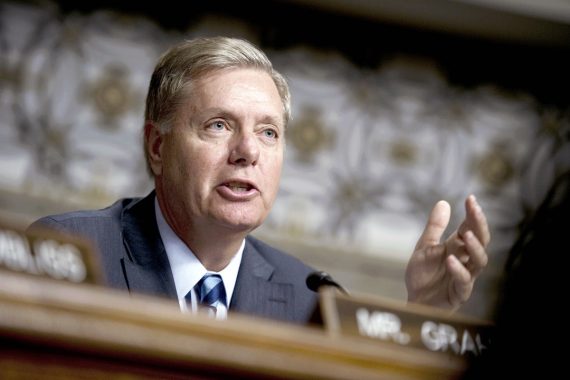
Senator Lindsey Graham on Fox News Sunday yesterday. During the interview, Chris Wallace rightly pointed out that the Senator’s views on congressional subpoenas had shifted between the time he was calling for President Clinton to be removed from office to now, where we find him to be a fierce defender of the current occupant of the White House.
Said the Senator in response:
”[Special Counsel Robert] Mueller’s investigation was a special counsel appointed to find out if the president committed a crime; if he colluded with the Russians; if he obstructed justice. The president gave 1.4 million documents to Muller. Everybody around the president was allowed to testify. He never claimed executive privilege. He complied, no cover-up, worked with Mueller. Mueller’s the final word on this for me.”
Emphasis mine.
Let me help the Senator out.
First, if you read the letter that Rod Rosenstein wrote that authorized the Mueller investigation you find that it was not simply “appointed to find out if the president committed a crime.” I point this out because it creates an utterly false framing insofar as it suggests that the matter is, in fact, closed if Mueller did not find a crime committed by the President.
In fact, given both the Office of Legal Counsel’s opinion on indicting a sitting president, and the political nature of the impeachment process, it is highly problematic to cast a presidential investigation as solely focused on whether a president committed crime. Moreover, in our system (whether it be in the courts or via impeachment), there is a charging phase, a trial, and a decision on guilt or innocence. No report should ever be the final word on whether a crime was committed or not.
Second, if the Mueller Report is Graham’s lodestone, let’s consider this rather key, and oft-quoted (so if the Senator hasn’t read the report, his has surely heard the following) passage:
if we had confidence after a thorough investigation of the facts that the President clearly did not commit obstruction of justice, we would so state. Based on the facts and the applicable legal standards, we are unable to reach that judgment. Accordingly, while this report does not conclude that the President committed a crime, it also does not exonerate him.
Vol. 2, p. 8 of the Mueller Report
This alone demonstrates that anyone who claims that the Mueller Report exonerates Trump on the question of obstruction is either ignorant of the content of the report or is a liar (or both).
Third, as to the notion that the report sees itself as the end of the line, I will note the following:
A) The report clearly sees the potential for post-presidency legal action against Trump.
The report notes:
while the OLC opinion concludes that a sitting President may not be prosecuted, it recognizes that a criminal investigation during the President’s term is permissible. The OLC opinion also recognizes that a President does not have immunity after he leaves office.
Vol 2, p. 1.
And goes on to note in a footnote:
OLC Op. at 255 (“Recognizing an immunity from prosecution for a sitting President would not preclude such prosecution once the President’s term is over or he is otherwise removed from office by resignation or impeachment”).
Vol 2, p. 1, fn4
There is also footnote 1091, which further expands on the fact that even after impeachment, a president could face criminal prosecution. We also see a repeat of the line quotes above in footnote 4.
A possible remedy through impeachment for abuses of power would not substitute for potential criminal liability after a President leaves office. Impeachment would remove a President from office, but would not address the underlying culpability of the conduct or serve the usual purposes of the criminal law. Indeed, the Impeachment Judgment Clause recognizes that criminal law plays an independent role in addressing an official’s conduct, distinct from the political remedy of impeachment. See U.S. CONST. ART. I, § 3, cl. 7. Impeachment is also a drastic and rarely invoked remedy, and Congress is not restricted to relying only on impeachment, rather than making criminal law applicable to a former President, as OLC has recognized. A Sitting President’s Amenability to Indictment and Criminal Prosecution, 24 Op. O.L.C. at 255 (“Recognizing an immunity from prosecution for a sitting President would not preclude such prosecution once the President’s term is over or he is otherwise removed from office by resignation or impeachment.”).
Vol 2., p. 178, fn1091
B) The report clearly sees impeachment as a possible follow-on from the report. Footnote 1091, quoted above, foresees this, for example.
There is also this from the executive summary of Volume II:
And apart from OLC’s constitutional view, we recognized that a federal criminal accusation against a sitting President would place burdens on the President’s capacity to govern and potentially preempt constitutional processes for addressing presidential misconduct.
Vol 2., p. 1
Emphasis mine.
Of course, the “constitutional process for addressing presidential misconduct” is the impeachment process.
Clearly, Mueller Report sees both impeachment and post-office criminal prosecution of Trump as legitimate possibilities all while clearly stating that the investigation did not exonerate Trump of obstruction. As such, if the Mueller Report is to guide Senator Graham, it cannot reasonably lead him now to inaction and proclamations of Trump’s innocence.
But, of course, we know that Graham (and all the other defenders of Trump) are hoping that no one reads the Mueller Report so that they can pretend, as Trump has done from the beginning, that it clears him. It is a rhetorical and political tactic and has precious little to do with the truth.

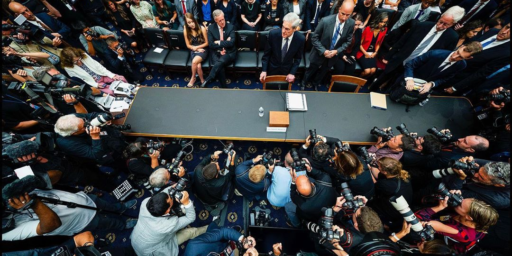
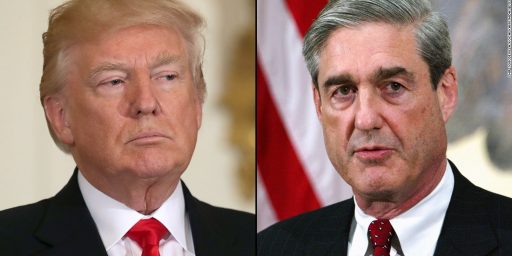

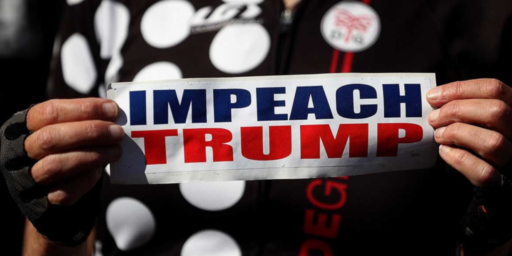
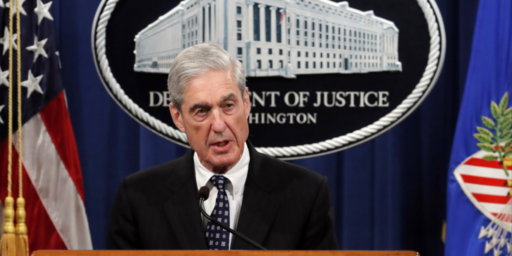
While not a lawyer, the Mueller report sounds awfully like a grand jury’s “no bill”. Time to move on.
@John430: First, it isn’t a grand jury report, making the comparison problematic.
Second, given both the OLC opinion and the unique circumstances of investigating a president, the document really cannot be judged like a grand jury report.
Third, I would love to see your argument based on the actual text of the document.
@Steven L. Taylor:
After all, I provided about 800 words with quotes and page references.
@Steven L. Taylor:..I would love to see your argument based on the actual text of the document.
This is all John and his ilk can see.
@John430:
BTW, I am not a lawyer, either and actually have no experience with what a grand jury report looks like.
Do you have an example of ~400 pp. grand jury no bill I could look at?
We should have literacy tests for Senators, apparently. If they can’t read a document like the Mueller report, they should be removed from office.
I don’t know what Trump has on Graham but there must be photos. Maybe even video. Because no one is all-in like this without a really good reason.
@Kathy: An integrity test would be a nice thing, too, however that could work.
@Not the IT Dept.: Lindsey’s primary voters are JKBs and Pauls and Guarneris etc. He has to go Full Retard.
@Steven L. Taylor: Yeah, but he’d have to read it and think about what it says to come up with a position then. This is much easier.
ETA: “We should have literacy tests for Senators, apparently. If they can’t read a document like the Mueller report, they should be removed from office.”
That’s not a solution. If we did that, where would Senators come from? Same problem with an integrity test, too!
@Just nutha ignint cracker:
Would we be that much worse off? 😉
@Steven L. Taylor:
“if we had confidence after a thorough investigation of the facts that the President clearly did not commit obstruction of justice, we would so state. Based on the facts and the applicable legal standards, we are unable to reach that judgment. Accordingly, while this report does not conclude that the President committed a crime, it also does not exonerate him.”
The report notwithstanding lack of confidence of its writers to form judgment wasn’t set out to exonerate, because it wasn’t part of the terms of references. The report was to find out whether he did xyz and if he did xyz was material to warrant further action? You are simply misusing the laws of excluded middle in this matter where it doesn’t even matter. He and his cohorts might have conducted themselves in way that might provoked suspicion of wrong doing but in matters of law you can’t simply throw ingredient like Intention away. Questions like whether he set out with purpose to cause, given that there was some contact would be assessed. Those are all part of the standards.
The question of obstruction was only incidental to the investigation and not primary object of the investigation.
@Samuel:
If you read the letter (linked above) you will find it includes the phrase “any matters that arose or may arise directly from the investigation”–that is more than sufficient grounds to investigate if Trump was obstructing justice in this matter.
And, regardless, if there is sufficient evidence (and the report contains such) that the President attempted to obstruct justice, then that behooves the House to investigate further.
@Samuel:
If obstruction occurred then that in itself excludes the possibility of exoneration not just on obstruction but on the underlying charge. Had Trump co-operated with the investigation rather than obstructing it we might now have some confidence in the report’s findings, but ‘I managed to hide the evidence’ is not a basis for exoneration. A successful cover-up is not exoneration, and in fact Trump himself made exoneration impossible.
@Samuel:
The report found many instances of “collusion”; Mueller concluded that the Russians did interfere, Trump was aware of the interference, he benefited from and encouraged the interference – e.g., Don, Jr. was eager to get and use information on Hillary Clinton – and he didn’t report the interference to the FBI. What Mueller couldn’t prove was “conspiracy”, and in this he was hampered by Dennison’s Obstruction. From the Mueller Report introduction; “A statement that the investigation did not establish particular facts does not mean there was no evidence of those facts.” The report goes on to state that it was hampered in this effort by
unnamed individuals who invoked their Fifth Amendment right, witnesses also gave false testimony, leading to some charges, and “practical limits” on getting information and documents from “numerous witnesses and subjects” who live outside the U.S. Some individuals, including some on the Trump campaign also “deleted relevant communications” or used encrypted apps to shield their chatter.
So…in other words, the obstruction worked.
Your stand is that if obstruction works, then it’s legal.
That’s stupid.
If you or I did what Dennison and his campaign did, we would be in jail. You prefer that the POTUS be above the law; that he be a king. Seriously…you want a king, and this fat orange fuq is the best you can do???
I’ve started seeing YouTube ads for outlets pitching their newspaper with a free wall poster about “Spygate”. I wonder “why did they think to target me with this?” but I watched one for the sake of curiosity.
I have a bit of despair here. It’s like a segment of the country has its own alternate reality, and they’ve sucked in people like Lindsey Graham. As far as I can tell, this is much bigger than Trump, it will be with us long after he’s gone.
This is the fruit of Soviet-style information warfare, as applied to the internet by numerous actors. I have no idea what to do about it.
: @Jay L Gischer: I personally favor release of the Mueller reports. The government keeps too many records secret now that are from the distant past, and most likely will be “lost” and never released.
There are some reasons that Mueller probably does not want to release all of the files and materials:
Many of the people involved probably gave information on the promise of complete confidentiality. That’s the way these things work.
Some of Director Mueller’s agents and assistants work under the cloak of secrecy. Revealing their identity could very well blow their cover and put them in danger, and jeopardize other cases.
Mueller most likely used various types of secret advanced technology that the US intelligence can ill afford for other countries and groups to see. And the American people might possibly be shocked at some of the things they use.
Mueller probably doesn’t want people to know some of the tactics that may have been used: strong arm tactics such as SWAT type raids carrying automatic weapons in the night: methods that would alarm and outrage the public. If that is how they will treat someone important, how would they treat regular people?
@Tyrell: Ok, so attempt at parody gone wrong, or what?
@Tyrell: “…strong arm tactics such as SWAT type raids carrying automatic weapons in the night…”
In other words, common police methods which the right supports when it’s ‘them’ who are the targets.